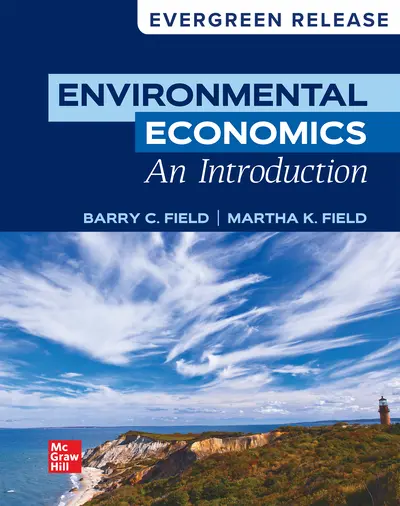My Account Details

ISBN10: 1266543066 | ISBN13: 9781266543067

Environmental Economics: An Introduction
Product not yet available for student view. Change to an older release to view student options.
- Lowest Price!
McGraw Hill eBook
Textbook Rental (150 Days Access)
- Rent for a fraction of the printed textbook price
- Complete text bound in hardcover or softcover
Loose-Leaf Purchase
Unbound loose-leaf version of full text
Shipping Options
- Standard
- Next-day air
- 2nd-day air
Orders within the United States are shipped via FedEx or UPS Ground. For shipments to locations outside of the U.S., only standard shipping is available. All shipping options assume the product is available and that processing an order takes 24 to 48 hours prior to shipping.
Note: Connect can only be used if assigned by your instructor.
Connect (180 Days Access)
- Digital access to a comprehensive online learning platform
- Includes homework, study tools, eBook, and adaptive assignments
- Download the free ReadAnywhere app to access the eBook offline
Connect + Loose-Leaf
- Comprehensive online learning platform + unbound loose-leaf print text package
- Connect includes homework, study tools, eBook, and adaptive assignments
- Download the free ReadAnywhere app to access the eBook offline
Shipping Options
- Standard
- Next-day air
- 2nd-day air
Orders within the United States are shipped via FedEx or UPS Ground. For shipments to locations outside of the U.S., only standard shipping is available. All shipping options assume the product is available and that processing an order takes 24 to 48 hours prior to shipping.
McGraw Hill eBook
Details:
- Normally the lowest price option for student
- Integrates in your LMS
- Accessible tools for students, including read-aloud functionality, jump links and dynamic note-taking and highlighting features
Textbook Rental (150 Days Access)
Details:
- Rentable option
- Hardcopy and softcover formats
Loose-Leaf Purchase
Details:
- Unbound loose-leaf version of full text
Connect (180 Days Access)
Details:
- Integrates in your LMS
- Prebuilt courses, presentation slides and instructor resources
- Test question banks, adaptive assignments, essay prompts, video content and more interactive exercises specific to your course subject
- eBook access (with included ReadAnywhere app)
- Print book add-on availability
- Remote proctoring
Connect + Loose-Leaf
Details:
- Comprehensive online learning platform + unbound loose-leaf print text package
- Connect includes homework, study tools, eBook, and adaptive assignments
- Download the free ReadAnywhere app to access the eBook offline
* The estimated amount of time this product will be on the market is based on a number of factors, including faculty input to instructional design and the prior revision cycle and updates to academic research-which typically results in a revision cycle ranging from every two to four years for this product. Pricing subject to change at any time.
This is a comprehensive learning experience designed for students with limited to no economics background. Explore a wealth of new and revitalized material: updated data and content, robust test bank, cutting-edge exhibits reflecting current global issues and real-world applications, refreshed figures, tables, sources, and references. Engage with thought-provoking end-of-chapter discussion questions that encourage critical thinking and application of knowledge. Enhancements include a shift in focus from "global warming" to "climate change," which takes a more prominent role throughout the text. The discussion of social and environmental justice topics has been significantly expanded, complemented by a comprehensive DEI review. This book is not just a guide; it's a call to action; to explore the intersection of economics and the environment, where informed decisions pave the way for a sustainable future.
1. What Is Environmental Economics?
2. The Economy and the Environment
SECTION TWO: ANALYTICAL TOOLS
3. Benefits and Costs, Supply and Demand
4. Markets, Externalities, and Public Goods
5. The Economics of Environmental Quality
SECTION THREE: ENVIRONMENTAL ANALYSIS
6. Frameworks of Analysis
7. Benefit–Cost Analysis Benefits
8. Benefit–Cost Analysis Costs
SECTION FOUR: ENVIRONMENTAL POLICY ANALYSIS
9. Criteria for Evaluating Environmental Policies
10. Decentralized Policies Liability Laws, Property Rights, Voluntary Action
11. Command-and-Control Strategies: The Case of Standards
12. Incentive-Based Strategies: Environmental Charges and Subsidies
13. Incentive-Based Strategies: Market Trading Systems
SECTION FIVE: ENVIRONMENTAL POLICY IN THE UNITED
STATES
14. Federal Water Pollution Control Policy
15. Federal Air Pollution Control Policy
16. Federal Policy on Toxic and Hazardous Substances
17. State and Local Environmental Issues
SECTION SIX: GLOBAL ENVIRONMENTAL ISSUES
18. Global Climate Change
19. International Environmental Agreements
20. Globalization
21. Economic Development and the Environment
APPENDIX A. Abbreviations and Acronyms Used in the Book
APPENDIX B. Additional Websites
About the Author
Barry C. Field
Barry C. Field is Professor of Resource Economics at the University of Massachusetts in Amherst. Previously he taught at the University of Miami and The George Washington University. He received his B.S. and M.S. degrees from Cornell University, and his Ph.D. from the University of California at Berkeley.At the University of Massachusetts he has devoted many years to teaching natural resource economics to students at all levels, and has worked to develop an undergraduate major in environmental and resource economics.Professor Field is the author of numerous articles on resource and environmental economics.
Martha K Field
Martha K. Field is Professor of Economics at Greenfield Community College, where she has taught environmental economics for many years. She has taught at the University of Massachusetts, Mount Holyoke College, Westfield State College, Holyoke Community College, and the Consumer Cooperative at Gomel, Belarus. She received a B.S. and M.S. from the University of Massachusetts and holds a Ph.D. from the University of Connecticut.
Need support? We're here to help - Get real-world support and resources every step of the way.